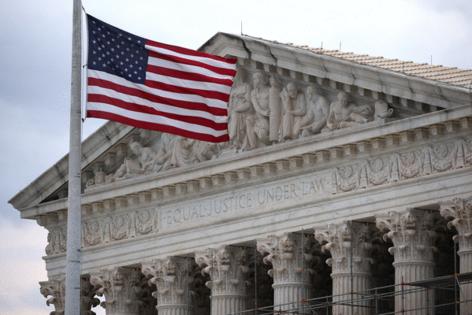Supreme Court might upend Voting Rights Act and help GOP keep control of the House
Published in Political News
WASHINGTON — The Supreme Court may help the GOP keep control of the House of Representatives next year by clearing the way for Republican-led states to redraw election districts now held by Black Democrats.
That prospect formed the backdrop on Wednesday as the justices debated the future of the Voting Rights Act in a case from Louisiana.
The Trump administration's top courtroom attorney urged he justices to rule that partisan politics, not racial fairness, should guide the drawing election districts for Congress and state legislatures.
"This court held that race-based affirmative action in higher education must come to an end," Solicitor General D. John Sauer wrote in his brief. The same is true, he said, for using the Voting Rights Act to draw legislative districts that are likely to elect a Black or Latino candidate.
Too often, he said, the civil rights law has been "deployed as a form of electoral race-based affirmative action to undo a state's constitutional pursuit of political ends."
The court's conservatives lean in that direction and sought to limit the use of race for drawing district boundaries. But the five-member majority has not struck down the use of race for drawing district lines.
But the Trump administration and Louisiana's Republican leaders argued that now was the time to do so.
If the court's conservatives hand down such a ruling in the months ahead, it would permit Republican-led states across the South to redraw the congressional districts of a dozen or more Black Democrats.
"There's reason for alarm," said Harvard law professor Nicholas Stephanopoulous. "The consequences for minority representation would likely be devastating. In particular, states with unified Republican governments would have a green light to flip as many Democratic minority-opportunity districts as possible."
Such a ruling would also upend the Voting Rights Act as it had been understood since the 1980s.
As originally enacted in 1965, the historic measure put the federal government on the side of Blacks in registering to vote and casting ballots.
But in 1982, Republicans and Democrats in Congress took note that these new Black voters were often shut out of electing anyone to office. White lawmakers could draw maps that put whites in the majority in all or nearly all the districts.
Seeking a change, Congress amended the law to allow legal challenges when discrimination results in minority voters having "less opportunity ... to elect representatives of their choice."
In decades after, the Supreme Court and the Justice Department pressed the states, and the South in particular, to draw at least some electoral districts that were likely to elect a Black candidate. These legal challenges turned on evidence that white voters in the state would not support a Black candidate.
But since he joined the court in 1991, Justice Clarence Thomas has argued that drawing districts based on race is unconstitutional and should be prohibited. Justices Samuel A. Alito, Neil M. Gorsuch and Amy Coney Barrett dissented with Thomas two years ago when the court by a 5-4 vote approved a second congressional district in Alabama that elected a Black Democrat.
Chief Justice John G. Roberts wrote the opinion. Justice Brett M. Kavanaugh cast the deciding fifth vote but also said he was open to the argument that "race-based redistricting cannot extend indefinitely into the future."
That issue is now before the court in the Louisiana case.
It has six congressional districts, and about one-third of its population is Black.
Prior to this decade, the New Orleans area elected a Black representative, and in response to a voting right suit, it was ordered to draw a second district where a Black candidate had a good chance to win.
But to protect its leading House Republicans — Speaker Mike Johnson and Majority Leader Steve Scalise — the state drew a new elongated district that elected Rep. Cleo Fields, a Black Democrat.
Now the state and the Trump administration argue the court should strike down that district because it was drawn based on race and free the state to replace him with a white Republican.
©2025 Los Angeles Times. Visit at latimes.com. Distributed by Tribune Content Agency, LLC.
























































Comments